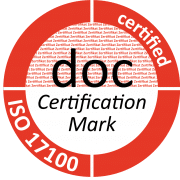How does the European Single Electronic Format (ESEF) affect financial report translations?
The financial reports of listed companies in the EU must now adhere to a new format, the European Single Electronic Format. The ESEF applies from the beginning of the financial year 2020, affecting the reports EnglishBusiness will be translating in early 2021. So, what does this mean for your financial report and how does it relate to other reporting requirements?
Photo credit: Guillaume Périgois
What is the European Single Electronic Format (ESEF)?
Publicly listed companies that are regulated by the EU are required to prepare their financial reports for financial years beginning on and after 1 January 2020 in a particular format, known as the European Single Electronic Format (ESEF). This means data in these reports can be extracted, read and understood by a variety of different software. It also means that there will be consistency across companies, which makes reports and numbers more comparable and easier to comprehend. Many standard reporting software options will have fully integrated ESEF-compliant templates and guidelines to help you out.
What are the International Business Communication Standards (IBCS)?
The International Business Communication Standards (IBCS) are a set of rules for laying out charts and tables in your reports. Visual and conceptual design is very important for understanding data. Certain kinds of software can apply the standards automatically. Although these rules are not yet mandatory, they may become so in the future. More and more companies are taking these standards on board and presenting their data in ways that avoid misinterpretation to the greatest extent possible.
XBRL – the file format for ESEF?
XBRL is the open international standard for digital business reporting, managed by a global not-for-profit consortium, XBRL International. XBRL is a format for a document, just like PDF or XML, and is the format the ESEF requires. Having all financial documents in the same format is part of the ESEF’s goal to promote consistency and comparability. The XBRL format is supported by a wide variety of software packages and service providers and is open technology, which means it is free to license. Many of these software options can also integrate IFRS terminology and multiple languages.
Does ESEF relate to IFRS?
The team at EnglishBusiness has been working with the International Financial Reporting Standards (IFRSs) for a very long time – they are mandatory in 166 countries around the world! The vocabulary and conventions dictated by these standards are the basis of the ESEF taxonomy, so the IFRSs won’t change under the new ESEF regulations. The IFRS Foundation prepares and updates these standards annually to provide issuers with a hierarchical structure to be used to classify financial information. Facilitating comprehension of your company’s financial reports is already part of the high-quality translations we deliver, and we know that IFRS remains the most important of the reporting standards.
What does ESEF mean for the translation of your financial report?
The ESEF will not change the way we handle your translations. EnglishBusiness has been ahead of the consistency game for a long time – we work not only with IFRS but also with translation memories, client style sheets and a consistent client voice to make sure all your IR documents are telling the right story. Many of EB’s clients are listed companies carrying out standard business reporting, so we know how important it is that your translations are top quality in terms of consistency, accuracy and conformity.
Contact us to find out more about our financial report translations!
 Rebecca Hill
Rebecca Hill
Translation Editor & Consultant
Rebecca is from Auckland, New Zealand, where she got her degree in Translation Studies, specialising in German and French. Rebecca has travelled far and wide, but is now based in Berlin where she spends her free time visiting art galleries, reading and making her way through Berlin’s many excellent restaurants. At EnglishBusiness, she lends her expertise to the translation of financial reports and has a special soft spot for our Hamburg customers and their maritime puns.
Other interesting articles:















